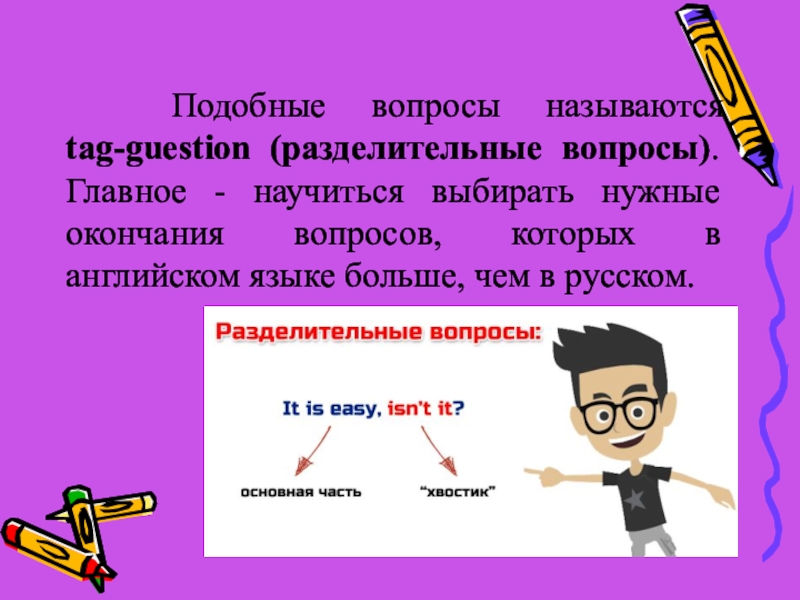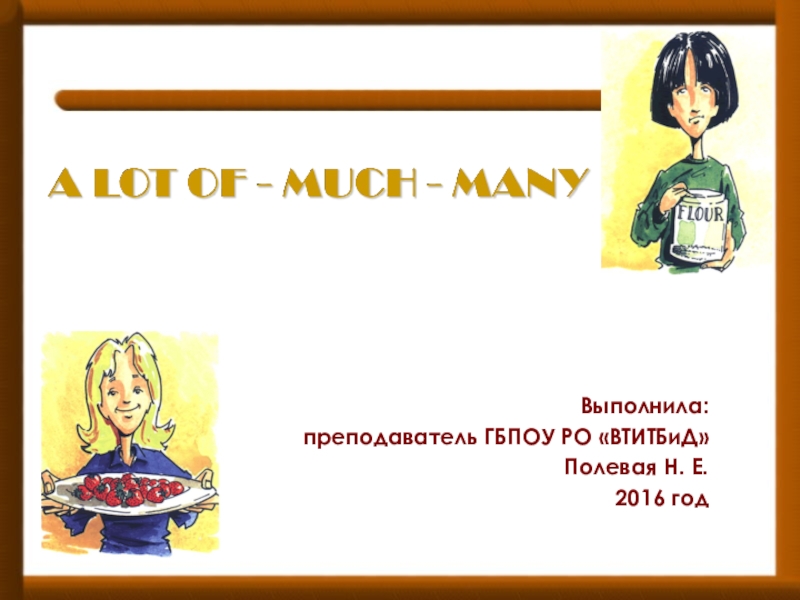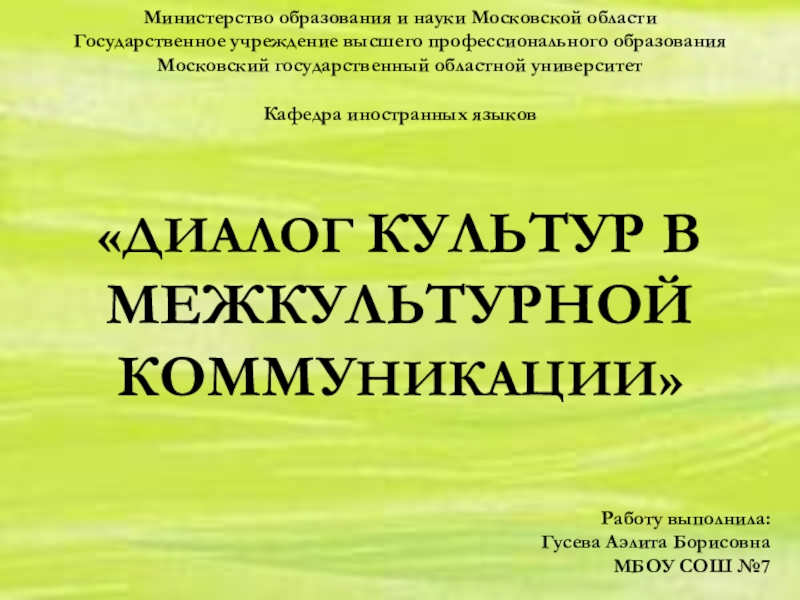- Главная
- Разное
- Образование
- Спорт
- Естествознание
- Природоведение
- Религиоведение
- Французский язык
- Черчение
- Английский язык
- Астрономия
- Алгебра
- Биология
- География
- Геометрия
- Детские презентации
- Информатика
- История
- Литература
- Математика
- Музыка
- МХК
- Немецкий язык
- ОБЖ
- Обществознание
- Окружающий мир
- Педагогика
- Русский язык
- Технология
- Физика
- Философия
- Химия
- Шаблоны, фоны, картинки для презентаций
- Экология
- Экономика
Презентация, доклад по английскому языку на тему Tag-questions (5 класс)
Содержание
- 1. Презентация по английскому языку на тему Tag-questions (5 класс)
- 2. Разделительные вопросыTag-questions
- 3. В английском языке существуют специальные
- 4. Подобные вопросы называются tag-guestion (разделительные
- 5. Правила их употребления I. Если
- 6. II. Если в первой части предложения глагол
- 7. III. Если в первой части предложения есть
- 8. IV. Если в первой части
- 9. Слайд 9
- 10. У каждого вопроса есть свой «хвостик»Будущее время:+
- 11. You liked the film, did not you?Вам
- 12. He is a student, isn’t he?They aren‘t
- 13. Слайд 13
- 14. Choose the right tag-ending.1. He can play
- 15. 4. You like black coffee, …?
- 16. 7. We haven’t got much time, …?
- 17. 10. She doesn’t speak Spanish at all,
- 18. Слайд 18
- 19. Good – bye, boys and girls!
Разделительные вопросыTag-questions
Слайд 3 В английском языке существуют специальные окончания вопросов, которые очень важны для
поддержания беседы. Они как бы помогают перебросить "мостик" к собеседнику, чтобы тот смог продолжить беседу.
Слайд 4
Подобные вопросы называются tag-guestion (разделительные вопросы). Главное - научиться
выбирать нужные окончания вопросов, которых в английском языке больше, чем в русском.
Слайд 5Правила их употребления
I. Если в первой части предложения глагол стоит в утвердительной
форме, то вторая часть предложения содержит глагол в отрицательной форме, а подлежащее заменяется на соответствующее местоимение.
Example: My friends are students, aren’t they?
Example: My friends are students, aren’t they?
Слайд 6
II. Если в первой части предложения глагол стоит в отрицательной форме, то вторая часть
предложения содержит глагол в утвердительной форме, а подлежащее заменяется на соответствующее местоимение.
Example: My friends aren’t students, are they?
Example: My friends aren’t students, are they?
Слайд 7
III. Если в первой части предложения есть глаголы to be (is, am, are,
was, were), to have (has, had), will / shall, can / could, would / must, то во второй части предложения используется тот же глагол.
Example: They have a big house in the country, haven’t they?
Example: They have a big house in the country, haven’t they?
Слайд 8
IV. Если в первой части разделительного вопроса использован любой
глагол, кроме модальных, глагола to be, оборота have got/has got, то вторая часть разделительных вопросов в present simple/past simple строится при помощи форм do/does, did.
Example: Your sister plays the piano very well, doesn’t she?
Example: Your sister plays the piano very well, doesn’t she?
Слайд 10У каждого вопроса есть свой «хвостик»
Будущее время:
+ will - will
not (wont) со всеми местоимениями
Прошедшее время:
+ did - did not (didn’t), + could - could not (couldn’t),
+ was – was not (wasn’t), + were - were not (weren’t),
+ had - had not (hadn’t); со всеми местоимениями
Настоящее время:
+ am - aren’t I
+ is -is nit (isn’t) he, she, it
+ are - are not (aren’t) we, you, they
+ do - do not (don’t) I, you, we, they
+ does - does not (doesn’t) he, she, it
+ can - can not (cant) со всеми местоимениями
+ have - have not (haven’t) I, you, we, they
+ has - has not (hasn’t) he, she, it
Прошедшее время:
+ did - did not (didn’t), + could - could not (couldn’t),
+ was – was not (wasn’t), + were - were not (weren’t),
+ had - had not (hadn’t); со всеми местоимениями
Настоящее время:
+ am - aren’t I
+ is -is nit (isn’t) he, she, it
+ are - are not (aren’t) we, you, they
+ do - do not (don’t) I, you, we, they
+ does - does not (doesn’t) he, she, it
+ can - can not (cant) со всеми местоимениями
+ have - have not (haven’t) I, you, we, they
+ has - has not (hasn’t) he, she, it
Слайд 11
You liked the film, did not you?
Вам понравился фильм, не так
ли?
She is a very good pupil, is not she ?
Она очень хорошая студентка, не так ли?
He can not ski, can he?
Он не умеет кататься на лыжах, не так ли?
She is a very good pupil, is not she ?
Она очень хорошая студентка, не так ли?
He can not ski, can he?
Он не умеет кататься на лыжах, не так ли?
Слайд 12He is a student, isn’t he?
They aren‘t at home, are they?
We
will go to the Zoo, won’t we?
Linda speaks French, doesn’t she?
I was in London, wasn’t I?
You weren’t busy, were you?
She can dance well, can’t she?
Linda speaks French, doesn’t she?
I was in London, wasn’t I?
You weren’t busy, were you?
She can dance well, can’t she?
Слайд 14Choose the right tag-ending.
1. He can play golf well, …?
a …, doesn’t he?
b …, can he?
c …, can’t he?
2. You are the new secretary, …?
a …, aren’t you?
b …, are you?
c …, don’t you?
3. Mr. Evans is speaking over the phone, …?
a …, is he?
b …, isn’t he?
c …, doesn’t you?
b …, can he?
c …, can’t he?
2. You are the new secretary, …?
a …, aren’t you?
b …, are you?
c …, don’t you?
3. Mr. Evans is speaking over the phone, …?
a …, is he?
b …, isn’t he?
c …, doesn’t you?
Слайд 154. You like black coffee, …?
a …, aren’t you?
b …, don’t you?
c …, do you?
5. I’m busy, …?
a …, aren’t I?
b …, don’t I?
c …, am not I?
6. It’s a nice day, …?
a …, does it?
b …, is it?
c …, isn’t it?
b …, don’t you?
c …, do you?
5. I’m busy, …?
a …, aren’t I?
b …, don’t I?
c …, am not I?
6. It’s a nice day, …?
a …, does it?
b …, is it?
c …, isn’t it?
Слайд 167. We haven’t got much time, …?
a …, do we?
b …, don’t we?
c …, have we?
8. Sam doesn’t work hard, …?
a …, is he?
b …, does he?
c …, isn’t he?
9. There will be a nice film on TV tonight, …?
a …, won’t there?
b …, will it?
c …, will there?
b …, don’t we?
c …, have we?
8. Sam doesn’t work hard, …?
a …, is he?
b …, does he?
c …, isn’t he?
9. There will be a nice film on TV tonight, …?
a …, won’t there?
b …, will it?
c …, will there?
Слайд 1710. She doesn’t speak Spanish at all, …?
a …, does she?
b …, don’t she?
c …, is she?
11. It’s nice to invite British students, …?
a …, does it?
b …, is it?
c …, isn’t it?
12. It was a wonderful game, …?
a …, was it?
b …, did it?
c …, wasn’t it?
b …, don’t she?
c …, is she?
11. It’s nice to invite British students, …?
a …, does it?
b …, is it?
c …, isn’t it?
12. It was a wonderful game, …?
a …, was it?
b …, did it?
c …, wasn’t it?
























